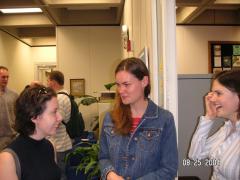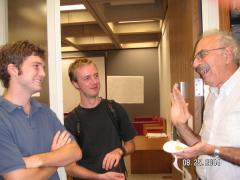|

New Graduate Student Orientation
|
|
|

New Graduate Student Orientation
|
|
|
|
|
The direction of our changes We
have revisited the graduate program, evaluated its structural
requirements and sought to adapt the intellectual, social and
professional training of students in view of current circumstances. The
direction of our changes: To affirm the Ph.D. as the beginning phase in a process of lifelong learning.To draw on the creative potential of students as well as faculty in a collaborative effort to research and teach history.To foster habits of collaboration in order to create transnational and transcultural histories.
New Graduate Student Handbook
The handbook has undergone a complete overhaul with the goal of
providing a clear statement of expectations and an emphasis on the
reciprocal obligations of faculty and graduate students in all aspects
of the program. This includes teaching, coursework, and the fulfillment
of requirements.
Graduate Program Checklist
This
checklist was developed so that graduate students and their advisors
can take a cooperative role in selecting courses and fulfilling
requirements to ensure timely progress.
|
|
|
More about our department The
Department of History is unusual among departments in the United States
in the relatively high number of faculty specializing in Europe, Latin
America and Asia. Faculty and students draw on the rich resources
provided by the Asian Studies Center, the Center for Latin American
Studies, the Center for Russian and East European Studies, and the
Center for West European Studies / European Union Center at the
university. The department's comparative and transnational emphasis
opens possibilities for students of United States history to explore
subjects such as migration and diasporas; intellectual, social and
political exchange in the Atlantic world, and the problematic
relationship of economic development and rising inequality.
Commonalities
PowerPoint presentation from CID Convening, January 2004
Key Ideas
PowerPoint presentation from CID Convening, January 2004
|
|
|
|
Transnational and Thematic Seminars Fall 2004: HIST 2711 Texts and Contexts New
core seminar taught by Jonathan Scott and Ann Janetta. This seminar
links aspects of the history of ideas to the modes of their
transmission, and relates a variety of texts to the cultural as well as
historical circumstances of their generation.
syllabus
|
|
|
HIST 2712 Race, Ethnicity and Gender New
core seminar taught by Lara Putnam and Bruce Venarde. This seminar
explores the social construction of race, ethnicity and gender in
international and historical perspective. Each of these three kinds of
hierarchical differences join together a set of ideas about natural and
cultural essences that serve to define and justify social boundaries.
syllabus
|
|
|
HIST 2721 Atlantic History to 1800 Core
readings seminar taught by Marcus Rediker. This graduate colloquium
will introduce students to work in Atlantic history, both old and new,
ranging from R.R. Palmer to newer scholarship that approaches the
Atlantic world "from the bottom up."
syllabus
|
|
|
Coming in Spring 2005: Historiography/Methodology New seminar taught by Alejandro de la Fuente Capitalism and Empire New core seminar taught by Dick Oestreicher and Evelyn Rawski
|
|
|